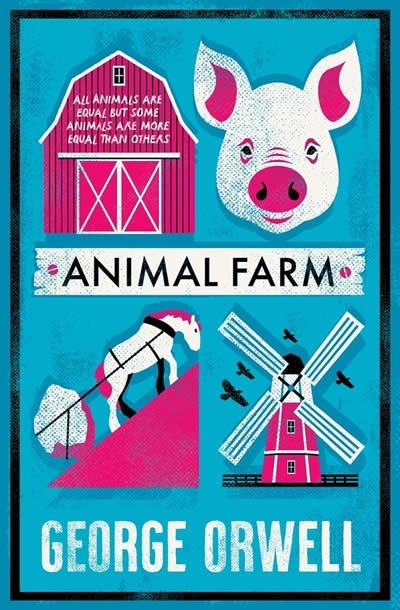Animal Farm

Editorial Alma Books Ltd
Fecha de edición enero 2021 · Edición nº 1
Idioma inglés
EAN 9781847498588
144 páginas
Libro
encuadernado en tapa blanda
Dimensiones 128 mm x 198 mm
Resumen del libro
Under the feckless husbandry of Mr Jones, Manor Farm has fallen into disrepair. Pushed into hardship, the animals decide to stage a revolt, and led by two young pigs, Snowball and Napoleon, they overthrow Mr Jones and drive him away from the farm. In the subsequent struggle for power, it is Napoleon that emerges as a victor: he renames the place "Animal Farm", gets rid of his enemies and, by the way he behaves - expecting to be glorified above the others and turning the screw on his fellow beasts in order to keep them subjugated - begins to resemble more and more the former rulers of the farm, the hated humans.
Written during the Second World War and published in 1945, this allegorical novel is a carefully constructed critique of the Russian Revolution and a sharp satire of the abuse of power. It remains unsurpassed both as a document of its time and as a testament to the versatility and creative genius of George Orwell. This new edition contains notes and extra material for students
Biografía del autor
Fue en 1903 cuando Eric Arthur Blair, el escritor británico más conocido por su seudónimo George Orwell, nació en Motihari, India. Estudió en el Eton College de Inglaterra gracias a una beca, y prestó sus servicios en la Policía Imperial. Estuvo destinado en Birmania, de 1922 a 1927, fecha en que regresó a Inglaterra. Enfermo y luchando por abrirse camino como escritor, vivió durante varios años en la pobreza, primero en París y más tarde en Londres. Como resultado de esta experiencia escribió un primer libro 'Sin blanca en París y Londres' (1933), donde relata las sórdidas condiciones de vida de las gentes sin hogar. 'Días en Birmania' (1934), un feroz ataque contra el imperialismo, es también, en gran medida, una obra autobiográfica. Su siguiente novela, 'La hija del Reverendo' (1935), cuenta la historia de una solterona infeliz que encuentra de manera efímera su liberación viviendo entre los campesinos. En 1936 Orwell luchó en el ejército republicano durante la Guerra Civil española (1936-1939). El autor describe su experiencia bélica en 'Homenaje a Catalunya' (1938), uno de los relatos más conmovedores escritos sobre esta guerra y en el que se hace responsable al Partido Comunista Español (PCE) y a la Unión Soviética de la destrucción del anarquismo español que supuso el triunfo de la Falange. 'El camino a Wigan Pier' (1937), escrita en esta misma época, es una crónica desgarradora sobre la vida de los mineros sin trabajo en el norte de Inglaterra. Su condena de la sociedad totalitaria queda brillantemente plasmada en una ingeniosa fábula de carácter alegórico, 'Rebelión en la granja' (1945), basada en la traición de Stalin a la Revolución Rusa, así como en la novela satírica '1984' (1949). Esta última ofrece una descripción aterradora de la vida bajo la vigilancia constante del "Gran Hermano". Cabe citar entre otros escritos, la novela 'Que vuele la aspidistra' (1936) y 'Disparando al elefante y otros ensayos' (1950), ambas consideradas modelos de prosa descriptiva, y 'Así fueron las alegrías' (1953), un recuerdo de sus difíciles años de estudiante. En 1968 se publicaron en cuatro volúmenes sus Ensayos Completos: Periodismo y Cartas. Orwell murió de tuberculosis en enero de 1950, dejando tras de sí un profundo escepticismo por las marañas políticas








